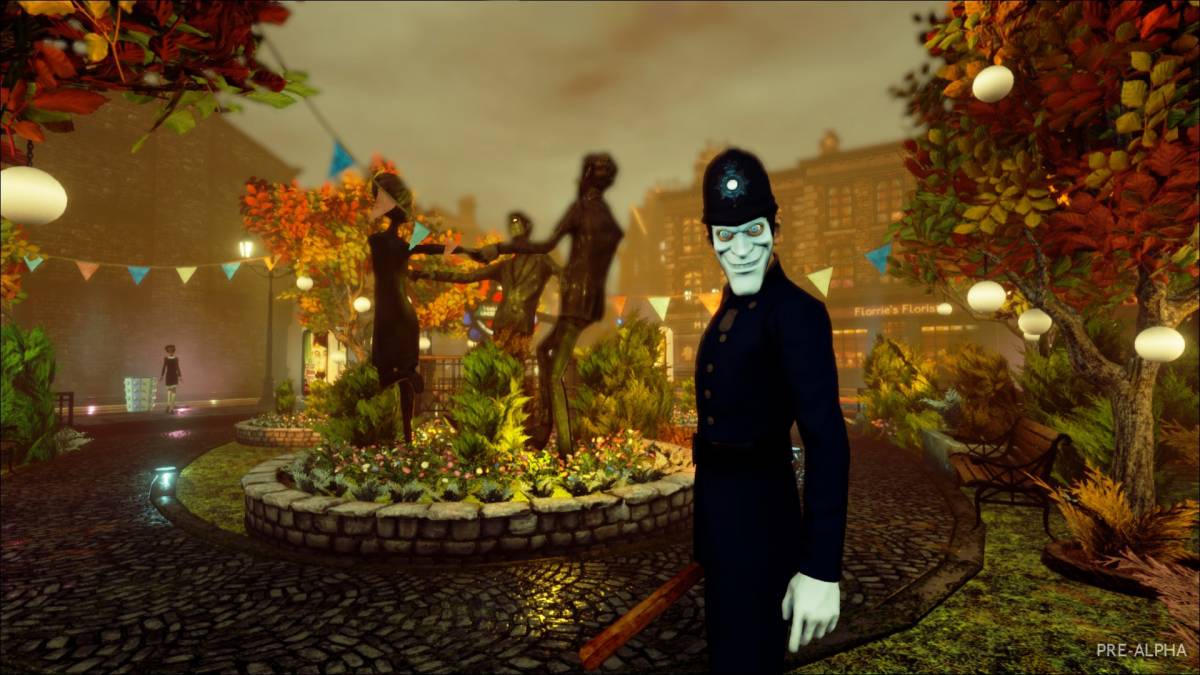The following contains spoilers for the early story of We Happy Few.
We Happy Few was released about a month ago to mixed reception. Glitch-ridden and a bit old hat compared to the likes of Dishonored (a comparison I am certainly not the first to make), it still has some interesting theming, writing, and humor that, in my opinion, saves the game from utter 6.5-7/10 mediocrity. Still, its most interesting element, Joy, is also perhaps where some of its biggest problems come from.
For those who have not played We Happy Few, Joy is a drug that citizens in the dystopian England setting take in order to forget their woes and, as you’d expect, feel nothing but joy. The main character Arthur begins the game secretly rejecting Joy (although he is quickly discovered) when he has a brief flashback to something horrible that happened to he and his brother, triggered by a newspaper he sees at his job as a government censor. From the very beginning, the game shows players the most interesting elements of its theme: ignorance may be bliss but the truth is more important.
Joy is absolutely key to exploring this theme, at least in the context of this story. The dystopian state requires that all citizens remain on Joy. There is propaganda all over about the evils of “Downers”, people who either cannot or refuse to take Joy. Downers are hunted by the government and either exiled or casually murdered, often through mob violence. The common Joy taking citizens are meanwhile called “Wellies”, a cute and sinister name implying that they are all well and perfect, unlike the nasty Downers. Any protest or rejection of the country’s social norms is chalked up to Downer behavior. Not unlike the likes of Fahrenheit 451 or The Giver, it is an intentionally extreme look at a variety of social issues in order to make a valuable point about the value of truth and dissension in the face of oppression.
Relatively early on, it becomes clear that in the world of We Happy Few, England did something horrible in WWII. Facing the constant siege of Nazi Germany, England appears to have surrendered and sent all children below the age of 13 to the country. The hows and whys are not immediately clear, and a big element of Arthur’s story is discovering those answers as he tries to get to Germany and find his brother Percy. This is an interesting alternate history take, as many in the States, like myself, sometimes forget the rightful pride many British citizens have that the British Empire managed to last against Nazi bombing after Nazi bombing, more or less alone in the war effort. Their “Darkest Hour”, as Churchill put it.
Joy, in the narrative, has all citizens (except in the case of things that trigger intense flashbacks) forget that they broke against the Nazis, abandoning their children to the enemy. For this same reason, Downers are driven almost (or entirely) mad, as they realize the shame of what they have done. To get political for but a moment, in this age of “Fake News”, it is a powerful message the game has. Utterly horrific truth is preferable to a lie, especially a lie that encourages the violent rejection of the truth. Citizens on Joy don’t just reject what Downer’s remember, they (or at least the Powers that Be) will kill to suppress it.
Which brings us to the game itself, or rather, where it fails. As should be no surprise to anyone who has played or heard about the game, We Happy Few is not perfect. One mechanic of the game, and a very understandable one, is that your character can take Joy. Joy allows you to better blend into society, get past certain barriers that detect whether one has taken Joy, and gives Arthur a (fairly funny and exaggerated) pep to his step, all while the world around you appears brighter and more serene. Once off Joy, Arthur crashes, the world becoming quite frightening and bleak (in what seems to be something worse than the real world, if I understand correctly), and Arthur being obviously off his Joy for a short time. The more Joy Arthur takes, the more a meter fills up, which when filled causes a blackout and vomiting. While I think arguably overdosing should simply be a failstate (similar to a death), I understand that such an outcome would brick some people’s games, and I admit otherwise the mechanic so far is fine. The issue with We Happy Few is how Arthur and others act while high on Joy.
Joy is supposed to make a person lose themself; this is very clear in the way the story is built. Wellies are happy, childish, easily manipulated, unpredictable, and have very short-term memories while on the drug. Admittedly, the game has a sort of cartoonish and zany logic to it in general, but citizens on Joy are very different than those off it. Except apparently Arthur. Sometimes. And bobbies, when it would be funnier or scarier.
There are genuinely interesting scenes in the game where bobbies (the tall policemen) are a bizarre (and quite funny) mix of extremely happy and polite, sinister, and completely ready to beat anyone to death who breaks the rules. I found this writing inconsistent however, with some clearly being too cynical or serious to make much sense if we are to believe they are on Joy. This is not a reference to the few moments in the story where someone on Joy is having a flashback either, by the way, which I understand is meant to show Joy is covering up old horrors, not completely hiding a person from them.
Arthur is the worse, but also more understandable, example of Joy being inconsistently portrayed. As the player character, Arthur can essentially take Joy whenever the player so desires (which is why I am more understanding of the difficulties writing for him). This is not encouraged in the game mechanics or story at all, but it is true nonetheless. Virtually nothing about the story or Arthur’s dialogue changes while high on Joy. He has throwaway lines as he takes Joy, which I appreciate, but then enters cutscenes and gives quest related dialogue completely the same as he would off his Joy. This is especially noteworthy because Arthur is cynical, sarcastic, depressed, and timidly rebellious in his quest and his conversations. He of all people should be weird and radically twisted by Joy.
I understand completely that, as a relatively small indie developer, Compulsion Games could not possibly have afforded alternative dialogue for any time Arthur could or could not be high. What is disappointing, and removes me from the game sometimes, is they seem to have not fully taken into account how important Joy radically changing someone’s personality is to their story. Arthur should not be able to do some quests while high on Joy. I understand he is not fully like a Wellie again just because he took one Joy but he definitely should have a line, cheerily given, about how he thinks he needs to come “down” before moving on or something. The game needs to jump more heavily into the idea that Joy makes some tasks impossible and some emotions very unreachable, even when those things might be important to his quest.
For all its faults, We Happy Few does interesting things with its groovy aesthetic and its theme of happy lies versus horrible truths. The game is genuinely funny at times, when its frustrating glitches and awkward animations don’t interfere (or are unintentionally hilarious themselves). Having not completed it yet, I expect some disappointing plot twists mixed in with what have been a few genuinely interesting ones, which is perhaps unfair and cynical of me. As things stand, I look at Joy and see an awesome narrative device. I just wish it was better implemented.
Some of the coverage you find on Cultured Vultures contains affiliate links, which provide us with small commissions based on purchases made from visiting our site.



